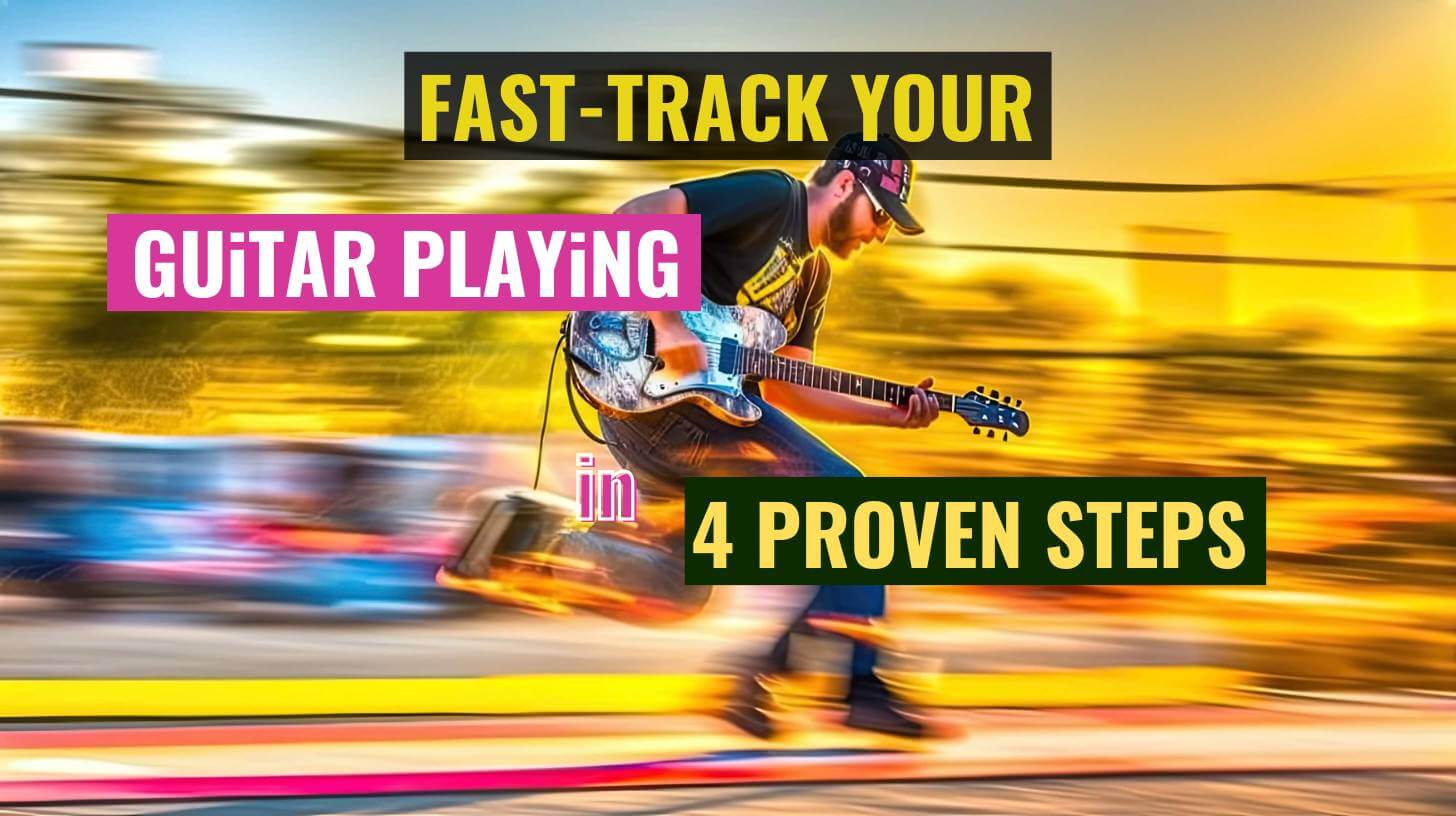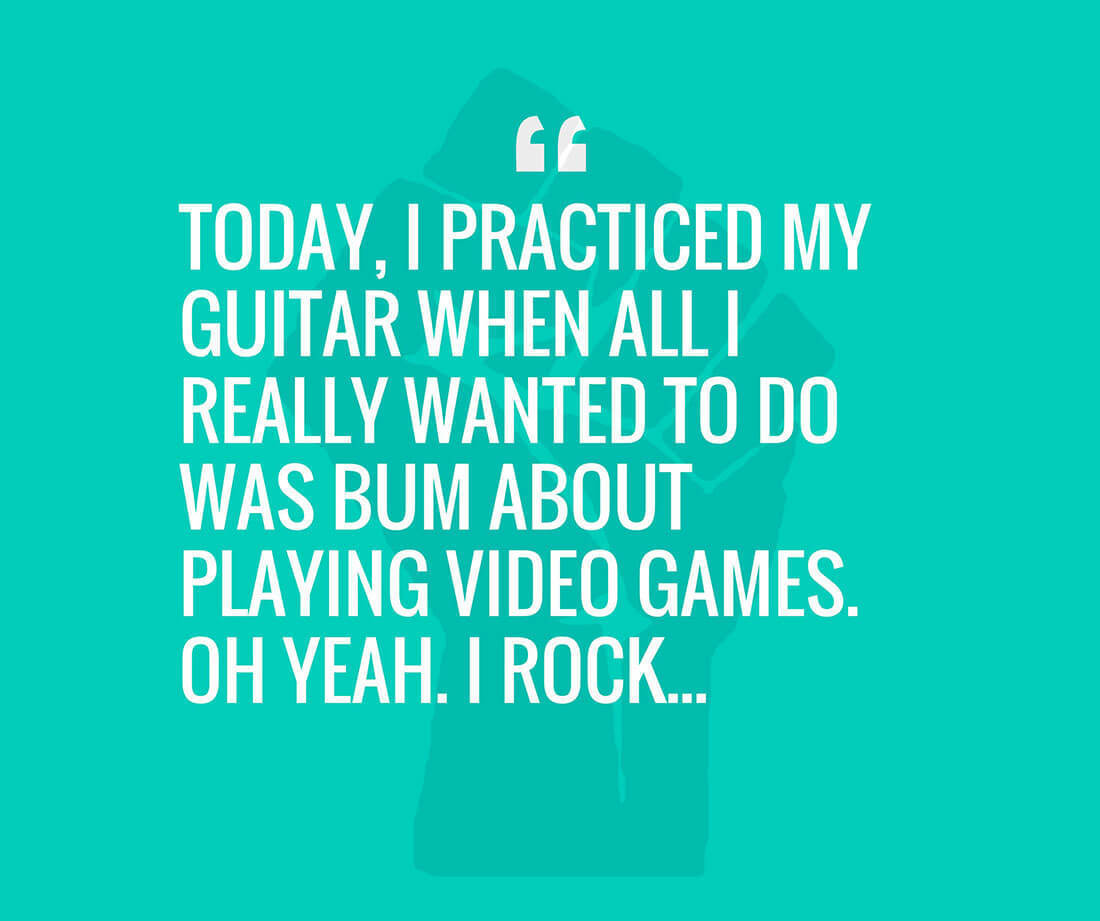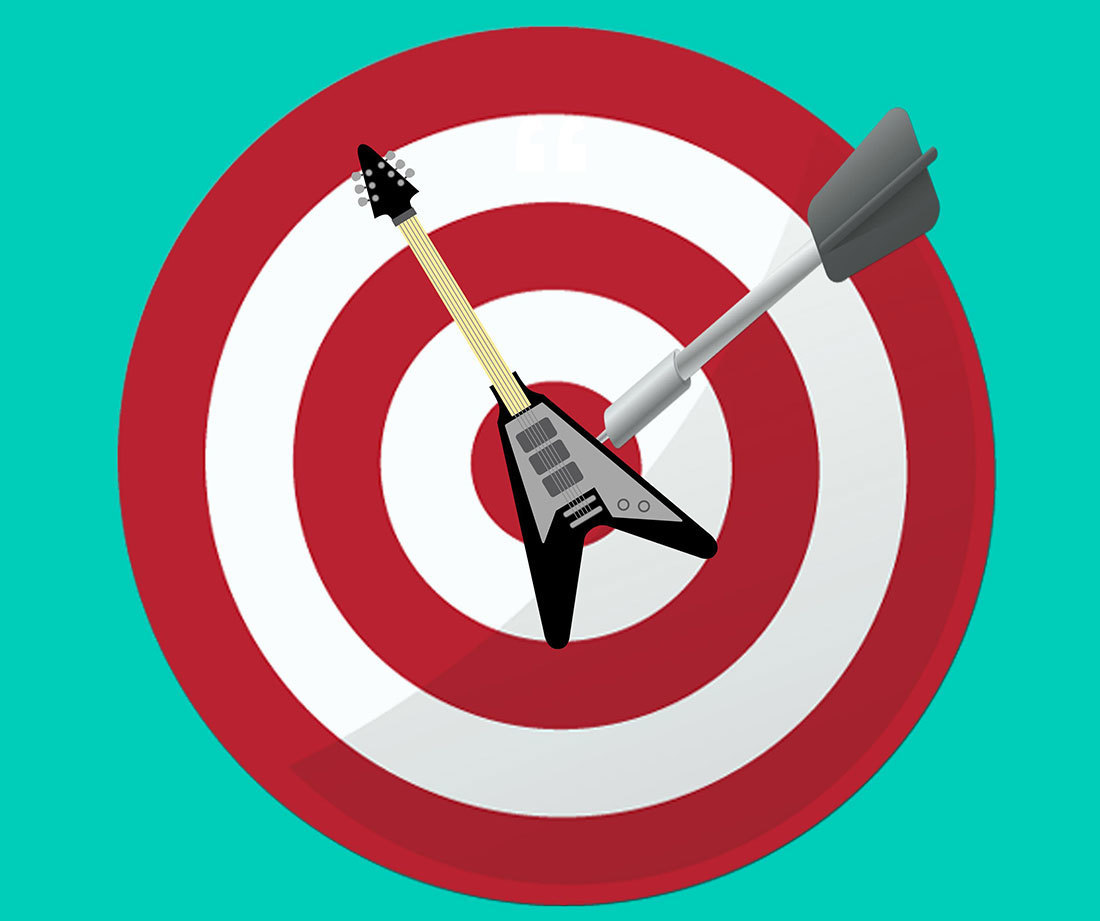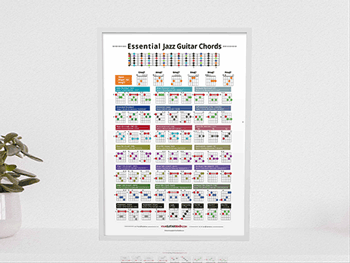We reveal four simple strategies you can use to fast-track your guitar playing to avoid frustration and keep your passion for playing burning bright.
Learning to play the guitar is both challenging and rewarding. In this post, we reveal the four steps that’ll help you hit the accelerator.
These steps are not random tips or hacks. They are the proven strategies that successful guitar players use to turbo-boost their learning and playing skills.
By following these steps, you will be able to:
- Solve the common problems and challenges that most guitar players face
- Learn how to practice more effectively and get better results in less time
- Play with more style and emotion, and have more fun playing guitar
Are you excited to improve your guitar playing and become a better musician?
Then let’s begin.
Step 1. Be The Boss of You
Only about 20% of people who start learning guitar stick with it long enough to become proficient. The other 80% give up.
Why is that?
The difference between the successful guitar players and the unsuccessful ones who throw in the towel is self-discipline.
Self-discipline is the ability to focus on what you need to do to achieve your goals, even when it’s difficult.
It’s about resisting distractions and temptations, and pushing yourself to practice, even when you don’t feel like it.
If you want to improve your guitar playing, the first thing you need to do is develop your self-discipline.
Here are a few tips:
- Start by setting small, achievable goals. For example, your first goal might be to practice for 25 minutes every day. Once you can consistently achieve that goal, you can set a new one, such as practicing for 35 minutes every day.
- Create a practice schedule. The trick is to stick to it as much as possible. This will help you stay on track and avoid making excuses.
- Find a practice partner. Or you can join a guitar class. This can help you stay motivated and accountable.
- Reward yourself for your hard work. For example, after a week of consistent practice, you could give yourself a new cool guitar accessory or a night out with friends.
Make This Work For You
Being self-disciplined doesn’t mean you have to be a drill sergeant. It simply means being intentional about your practice and avoiding distractions.
Here’s a simple exercise you can try:
- Next time you sit down to practice, set a timer for 20 minutes.
- During those 20 minutes, commit to not checking your phone, computer, or any other device.
- If you find yourself getting distracted, take a deep breath and bring your attention back to your guitar.
- After the 20 minutes are up, take a break. If you want to continue practicing, set the timer for another 20 minutes.
Repeat this exercise until it becomes a habit.
You’ll find by doing this simple action exercise your self-esteem and confidence soars. With each small act of self-discipline you perform, every other act becomes a walk in the park. Woohoo!
The result is your guitar playing will quickly progress. And not just as a result of less interruptions, but because you’ll feel more fired-up to be playing. Woohoo!
With each small act of self-discipline you perform, every other act becomes a walk in the park.
2. Combine Goals With This Crucial Ingredient
You are a teleological organism. This simply means you are purpose-driven. When you set yourself clear goals to achieve, you naturally zip into action until you achieve that goal.
It’s just the way you’re made.
Setting goals is important for guitar players because it gives you something to work towards and helps you stay motivated.
However, this is the secret most people don’t know: goals only work if you have a purpose to what you want to achieve.
That’s why they brush off goal setting, believing it doesn’t work for them.
The missing ingredient that makes goal setting ineffective for most people is purpose. Without a strong sense of the 'why', you'll fail.
So what is purpose exactly?
Your purpose is the reason why you want to learn to play guitar in the first place.
It could be anything from wanting to play your favourite songs to wanting to write your own music to wanting to perform in front of an audience.
Once you know your purpose, you can start to set goals that will help you achieve it.
For example, if your purpose is to play your favourite songs, you might set goals to learn a certain number of songs in a certain time-frame.
If your purpose is to write your own music, you might set goals to write a certain number of songs each month or to learn a new music theory concept.
And if your purpose is to perform in front of an audience, you might set goals to play in front of your friends to build up your confidence to perform at a local open mic night.
Make This Work For You
Here are a few tips for setting effective guitar playing goals that are aligned with your purpose:
- Be specific. Don’t just say “I want to be a better guitar player.” Instead, set specific goals, such as “I want to learn to play the solo to ‘Stairway to Heaven.'” or “I want to be able to play along with my favourite band’s songs without having to look at the tabs.”
- Make your goals measurable. This will help you track your progress and stay motivated. For example, you could set a goal to learn two new songs per month, or to be able to play a scale at 120bpm without making any mistakes.
- Make your goals achievable. Don’t set yourself up for failure by setting unrealistic goals. If you’re a beginner, don’t expect to be able to play like Jimi Hendrix overnight. Start with small, achievable goals and gradually work your way up.
- Make your goals relevant. Make sure your goals are aligned with your overall musical interests and purpose. For example, if your purpose is to play in a rock band, set goals that will help you become a better rock guitarist.
Once you have set your goals, it’s important to create a practice routine that will help you achieve them.
Your practice routine should be tailored to your individual needs and goals, and it should include a variety of activities, such as learning new songs, practicing scales and exercises, and playing along with backing tracks.
It’s also important to be patient and persistent. Learning to play guitar takes time and effort. Don’t get discouraged if you don’t achieve your goals overnight. Just keep practicing and you’ll eventually reach them.
And remember, the most important thing is to enjoy the process of learning to play guitar.
3. Add Colour to Your Chord Palette
It’s easy to stick to what you know.
The key to keeping your guitar playing fresh and your skills evolving is to learn more diverse chords.
Once you have learned the standard beginner major and minor chords, add more into the mix. Learn to play a minor chord in multiple voices, then add on jazzy chord extensions.
There’s nothing better than substituting a vanilla minor chord with a minor 7th or minor 9th for example. Or what about ditching that bog standard major triad for a dreamy sounding major 7th chord?
Here are a few tips:
- Learn the minor versions of all the major chords you know. This will give you a good foundation for building more complex chords.
- Add chord extensions, such as 7ths, 9ths, and 11ths. Chord extensions can add color and complexity to your chords.
- Learn to play chords in different positions on the fretboard. This will give you more flexibility and options when playing.
Limited-Time Offer! Save 15% on Essential Jazz Guitar Chords Chart Digital Poster
Start learning to play 65 of the most used common jazz (blues, funk and country too) chords + bonus guitar fretboard notes chart fast without waiting for shipping ⇩
Jazz Guitar Chord Shapes Include:
✨ Major seventh (Maj 7th)
✨ Minor seventh
✨ Dominant seventh
✨ Diminished – Half Diminished
✨ Major 9th / minor 9th / dom 9th
✨ Maj11th / minor 11th / dom 11th
✨ Maj13th / minor 13th / dom 13th
and more…
Make This Work For You
Here are a few specific ways to learn more chords:
- Find a chord chart or book that lists different types of chords, like my Essential Chords for Beginners book. Once you have a comprehensive list of chords, start learning them one by one.
- Listen to other guitar players and try to figure out the chords they’re playing. You can also ask a guitar teacher or friend for help.
- Use a metronome to practice playing chords at a consistent tempo. This will help you develop your muscle memory and make it easier to play chords smoothly.
- Try incorporating new chords into your favorite songs. This is a great way to practice using new chords in a musical context.
Here are a few additional tips:
- Don’t be afraid to experiment. Try playing different combinations of chords and see what sounds good to you.
- Don’t get discouraged if you don’t learn a new chord right away. It takes time and practice to learn new chords. Just keep practicing and you’ll eventually get it.
- Have fun! Learning new chords should be an enjoyable experience. If you’re not having fun, you’re less likely to stick with it.
Learning more chords is a great way to improve your guitar playing and make it more interesting.
By following the tips above, you can learn more chords and start using them in your music today.
4. Face Your Fears

Does the idea of playing guitar in front of other people scare the living daylights out of you?
If you answered yes, you’re not on your own.
The thing is, plucking up the courage to play in front of somebody other than your dog or kitty cat will do wonders for your confidence.
Many beginner guitar players I’ve taught scrunch their nose up when I mention setting a goal to play in front of others. It’s ok, this is down to lack of self-belief.
What I tell them is what I’m going to tell you now – confidence comes with competence.
The deal is, as your playing ability improves, you’ll surprise yourself how the idea of playing guitar in front of other people gradually becomes less daunting.
Confidence comes with competence.
Make This Work For You
Here are a few tips for facing your fears of playing guitar in front of others:
- Start small. If you’re really nervous, start by playing for a small audience of close friends or family members. Once you feel more comfortable, you can gradually increase the size of your audience.
- Set realistic goals. Don’t try to play a full concert right away. Start by setting a goal to play one song in front of your friends or family. Once you’ve achieved that goal, you can set a new goal, such as playing two songs in front of a small audience.
- Practice regularly. The more you practice, the more confident you will become in your playing. Make sure to practice playing the songs that you want to perform in front of others.
- Find a supportive community of musicians. Playing with other musicians can help you build your confidence and give you a chance to perform in a supportive environment. Look for local open mic nights or jam sessions.
- Focus on enjoying the experience. Playing guitar in front of others should be a fun and rewarding experience. If you’re not enjoying yourself, it will show in your performance. So relax, have fun, and let your music shine through.
Here are some additional tips to help you manage your nerves:
- Take deep breaths before and during your performance. This will help to calm your nerves and improve your focus.
- Visualise yourself giving a successful performance. This will help you to feel more confident and prepared.
- Don’t be afraid to make mistakes. Everyone makes mistakes, even the best musicians in the world. If you make a mistake, just keep going. The audience is not likely to notice or care.
By following these tips, you can overcome your fears and start playing guitar in front of others with confidence.
Summing it Up
There you have it. By following the four proven steps above, you can fast-track your progress and achieve your musical goals.
Learning to play guitar can be a challenging but rewarding journey. It’s important to remember that everyone learns at their own pace.
Don’t get discouraged if you don’t see results immediately. Just keep practicing and you will eventually reach your goals.
Most importantly, have a blast and enjoy the process of learning to play guitar. Music is a gift that can bring joy to your life and to the lives of others.
Peace and love brothers and sisters.













